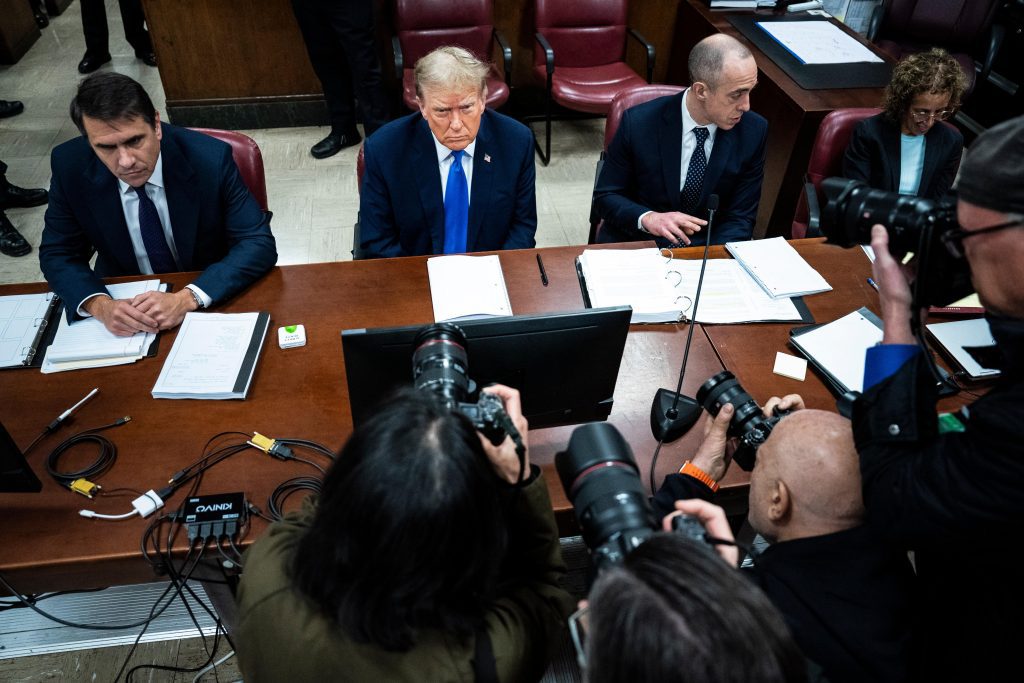By DAVID BAUDER and LARRY NEUMEISTER (Associated Press Writers)
NEW YORK (AP) — The judge presiding over Donald Trump’s hush money trial has instructed the media not to disclose where potential jurors have worked and to be cautious about sharing information about those who will judge the former president.
Judge Juan Merchan made this decision after one juror was dismissed due to concerns about being publicly known for her involvement in the case.
This highlights the challenge of preserving the anonymity of jurors in a highly publicized case while lawyers need access to as much information as possible in a public setting to make their selections.
Despite this setback, 12 jurors were chosen by the end of Thursday for the unprecedented trial regarding a $130,000 hush money payment made just before the 2016 election to adult film actress Stormy Daniels to prevent her from publicly discussing her claims of a previous encounter with Trump. He denies the encounter took place.
The dismissed juror told Merchan that friends, colleagues, and family were contacting her to ask if she was involved in the case. She stated, “I don’t think I can remain impartial and not let external pressures affect my decision-making in the courtroom.”
Merchan instructed reporters not to disclose specific workplaces of potential jurors. This placed journalists in a difficult position, as they heard this information in open court, and some media outlets were considering protesting this directive.
Even if that specific information wasn’t revealed, there was concern that enough details about potential jurors may still be leaked, leading to possible identification.
For instance, Politico on Thursday identified one potential juror as “a woman who lives in Manhattan and works as an asset manager.” She grew up in England and Hong Kong and lives with a self-employed boyfriend.
Another potential juror was noted as “an attorney for a large media company who lives in Gramercy Park.”
On Fox News Channel Wednesday night, host Jesse Watters discussed details about individuals selected for the jury and raised questions about whether some were “stealth liberals” aiming to convict Trump.
“This nurse scares me if I’m Trump,” he said. “She’s from the Upper East Side, has a master’s degree, is unmarried, has no children, lives with her fiancé, and gets her news from The New York Times and CNN.”
Aside from the order regarding employment history, Merchan also asked the media to “use common sense and avoid reporting on anything related to physical descriptions.”
He mentioned that it was unnecessary for the media to mention that one juror speaks with an Irish accent.
Anonymous juries have long been used, especially in terrorism and mob-related cases or when there is a history of jury tampering. They have become more common in the last two decades due to the growing influence of social media and the anonymous hate speech often linked with it. Courtroom artists are usually told not to draw the faces of any juror in their sketches; New York courts do not allow filming of legal proceedings.
During the Trump defamation court case During the Trump defamation trial in New York City federal court earlier this year, the jurors were given extra protection by a cautious judge who regularly prohibited anyone in the courtroom from having a cellphone, even if it was turned off. The jurors were transported to and from the courthouse by the U.S. Marshals Service and were kept away from the public during trial breaks.
When potential jurors in that case were asked general questions about themselves during the jury selection process, they often provided ambiguous answers that would have made it very difficult to learn much about them.
Following the decision in that case, Judge Lewis A. Kaplan instructed the anonymous jury not to reveal the identities of any of their fellow jurors and advised them not to disclose their service. Thus far, none have made their identities public.
Ron Kuby, a criminal defense attorney in New York, mentioned that state law requires trial lawyers to be given the names of the jurors, even when they are anonymous. However, he noted that this right can be overridden in order to protect the jurors' safety.
Regarding the media, he stated that the judge cannot control what is reported, but he can significantly limit what reporters observe and hear if necessary.
“The judge has options. Courts have exceptional authority to guard jurors from tampering and intimidation. This is where a court's power is most influential,” Kuby stated.
He emphasized the importance of the lawyers at Trump’s trial being able to research the social media history of the potential jurors.
“Both parties have an interest in preventing jurors with their own hidden motives from serving on the jury,” he noted.
Neama Rahmani, a former federal prosecutor and president of the West Coast Trial Lawyers, stated that the challenge in the Trump trial is identifying individuals with extreme viewpoints.
“Everyone in the entire country knows who Donald Trump is,” Rahmani said. “Some think he’s a criminal traitor and insurrectionist. Others think he’s a hero. You don’t have a lot of people in the middle.”
___









